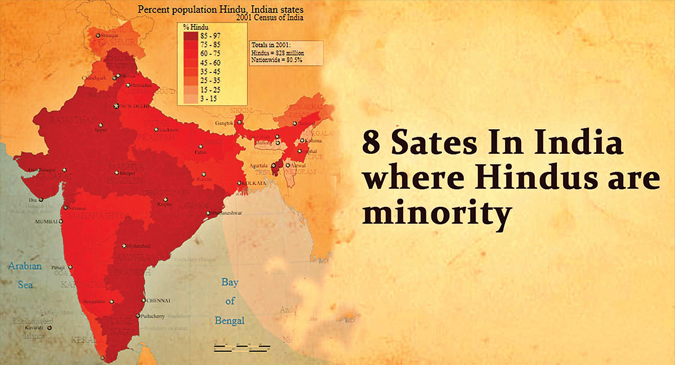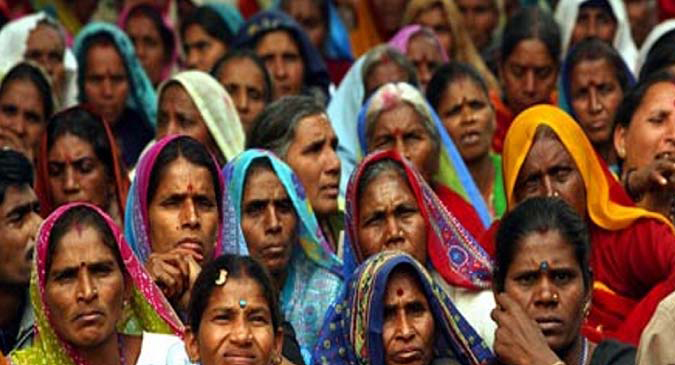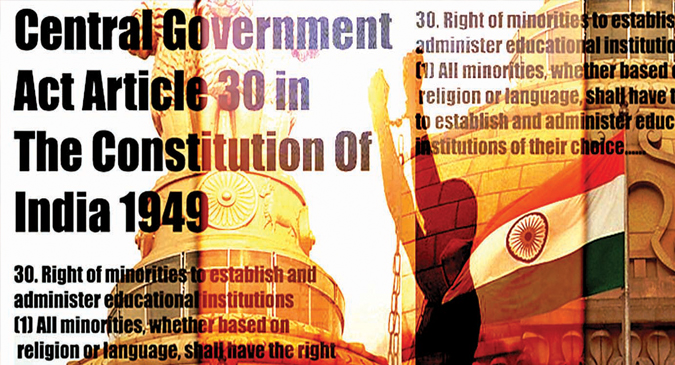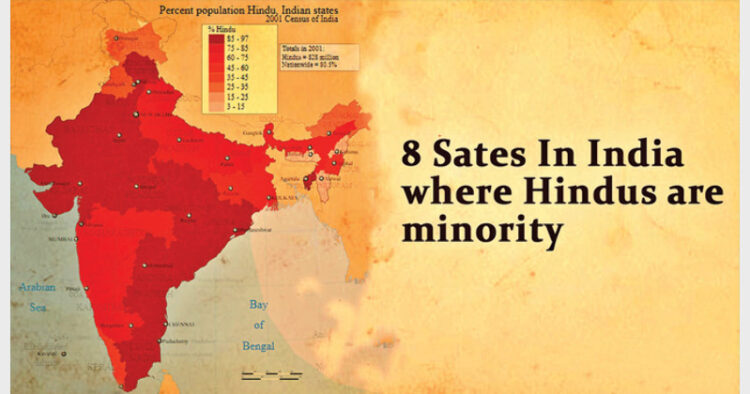Section 2(C) of the National Commission for Minorities Act is a blatant injustice meted out to Hindus who are a minority in eight states in the country. The unbridled power of the NCM has done irreparable damage to them.
Ashwani Upadhyaya
In 2002, the eleven judge Constitution Bench of the Supreme Court in T.M.A. Pai case had unequivocally stated that the unit for determining minority status is the State. Therefore, it is necessary that religious and linguistic minorities for the purposes of Articles 29 and 30 of the Constitution be determined State-wise countenancing numeric proportions of various communities in each State. However, despite the above unequivocal position of law, successive Governments have failed to apply above principle evenly by excluding the Hindus from purview of minority status and benefits.

In exercise of the unbridled powers conferred by Section 2(c) of the NCM Act, the then Central Government, through the Notification dated 23.10.1993, notified only five communities viz. Muslims, Christians, Sikhs, Buddhists and Parsis as ‘minority’ community, without framing guidelines and parameters for their identification or defining minority.
Muslims are actually majority in Lakshdweep (97%) and J & K (70%) and there is significant population in Assam (35%), West Bengal (28%), Kerala (27%), Uttar Pradesh (20%) and Bihar (19%). However, they are enjoying the ‘minority’ status, and the communities, which are real minorities, are not getting their legitimate share because of non-identification of minorities at State level, thereby jeopardising their fundamental rights. Government offered 20000 scholarships in field of technical education for minority students. In J&K, Muslims are 70% but government allotted 717 out of 753 scholarships to Muslim students but none to Hindus. This clearly reflects arbitrariness and illegality in Section 2(c) of the NCM Act and Notification on Minority Communities dated 23.10.1993. Likewise, Christians are majority in Mizoram, Meghalaya and Nagaland and there is significant population in Arunachal Pradesh, Goa, Kerala, Manipur, Tamil Nadu and West Bengal but they are also treated as minority.

Hindus are real minority in eight States i.e. Lakshadweep (2%), Mizoram (2%), Nagaland (8%), Meghalaya (11%), J&K (27%), Arunachal Pradesh (28%), Manipur (30%) and Punjab (38%). But, their minority rights are being eroded illegally and arbitrarily to majority population because Government has not notified them as ‘minority’ under Section 2 (c) of the NCM Act. Therefore, Hindus are being deprived of their rights, guaranteed under the Articles 25-30. Hence, Section 2(c) of the NCM Act and the Notification dated 23.10.1993, is not only arbitrary and unreasonable but also invalid, ultra-virus the Constitution.
The above statistics confirms that there has been no application of mind by the Government in identifying the minority. The power endowed by Section 2(c) of the NCM Act is therefore entirely unbridled and gives untrammeled power to the Government. Hence, it is manifestly arbitrary and offends Articles 14, 15 and 21 of the Constitution. This is also contrary to the series of judgments of the Supreme Court, be it RK Dalmia case (1959) or the Shreya Singhal case (2015). As a consequence of the above stated facts, those who are not entitled to minority protections under Articles 29-30, exemptions under Articles 15(5) and (6) of the Constitution, provisions of the Right to Education Act and various of the other welfare programmes, are enjoying these measures. Therefore, it is a clear violation of Articles 14, 15 and 21 of the Constitution of India.

Denial of minority rights to real minorities and providing arbitrary and unreasonable minority benefits to majority, infringes upon fundamental right to prohibition of discrimination on the grounds of religion, race, caste, sex or place of birth [Article 15(1)]; impairs the right to equality of opportunity in matters related to public employment [Article 16(1)]; and freedom of conscience and right to freely profess, practice and propagate religion [Article 25(1)]. It also erodes the obligation of the State ‘to endeavour to eliminate inequalities in status, facilities and opportunities’ [Article 38 (2)]. Therefore, Section 2(c) of the NCM Act and Notification dated 23.10.1993 should be repealed and minority should be defined and identified at State level.
- There has been no application of mind by the Government in identifying the minority. The power endowed by Section 2(c) of the NCM Act is therefore entirely unbridled and gives untrammeled power to the Government. Hence, it is manifestly arbitrary and offends Articles 14, 15 and 21 of the Constitution
- Hindus are real minority in eight States i.e. Lakshadweep (2%), Mizoram (2%), Nagaland (8%), Meghalaya (11%), J&K (27%), Arunachal Pradesh (28%), Manipur (30%) and Punjab (38%). But, their minority rights are being eroded illegally and arbitrarily to majority population because Government has not notified them as ‘minority’ under Section 2 (c) of the NCM Act
- The Preamble proudly announces that India is a Socialist Secular Democratic Republic. Democracy would indeed be hollow if it fails to generate a spirit of brotherhood among all sections of the people
The Prime Minister’s 15 Points Programme meant for religious and linguistic minorities is not being appropriately used, particularly in Arunachal Pradesh, Assam, Goa, Jammu & Kashmir, Kerala, Lakshadweep, Manipur, Meghalaya, Mizoram, Nagaland, Punjab, Tamil Nadu, Uttar Pradesh and West Bengal. Hindu’s legitimate share is being siphoned off arbitrarily to unqualified sections of population, because of non-identification and non-notification of minorities at State level. Thus, the central government should define the minority in such a way so that only those communities which are socially economically and politically non dominant and numerically inferior may enjoy the rights and protections Articles 29-30 while the State Governments should identify and notify religious and linguistic minorities at State level to safeguard rights of minorities guaranteed under Articles 25-30 of Constitution.
The Article 14 is a pillar on which rests securely the foundation of our Secular, Democratic Republic country. Right of equality is not merely for a few individuals. In Kasturi Lal Lakshmi Reddy Case (1980), the Supreme Court had held that “Where any governmental action fails to satisfy the test of reasonableness and public interest and is found to be wanting in the quality of reasonableness or lacking in the element of public interest, it would be liable to be struck down as invalid.”
The NCM is providing schemes like educational empowerment, economic empowerment, infrastructure empowerment etc., which is beyond the scope of Articles 29-30. The successive governments, through the NCM, intend to manage vote bank across Indian subcontinent. The duty of State to give benefit of Article 29-30 to minority community is limited and restricted to certain areas and the Supreme Court in the TMA Pai Case had already explained it.
Articles 29 and 30 are a group of articles relating to cultural and educational rights. Article 29(1) gives the right to any section of the citizens residing in India or any part thereof, and having a distinct language, script or culture of its own, to conserve the same. Article 29(1) does not refer to any religion, even though the marginal note of the Article mentions the interests of minorities. Article 29(1) essentially refers to sections of citizens who have a distinct language script or culture, even though their religion may not be the same. The common thread that runs through Article 29(1) in language, script or culture, and not religion. For example, if in any part of the country, there is a section of society that has a distinct language, they are entitled to conserve the same, even though the persons having that language may profess different religions. Article 29(1) gives the right to all sections of citizens, whether they are a minority or the majority religions, to conserve their language, script or the culture. In the exercise of this right to converse the language, script or culture, that section of the society can set up educational institutions. Article 29(2) provides that, where any educational institution is maintained by the state or receives aid out of state funds no citizen shall be denied admission on the grounds only of religion, race, caste, language or any of them. The use of the expression “any educational institution” in Article 29(2) would refer to any educational institution established by anyone, but which is maintained by the state or receives aid out of state funds. In other words, on a plain reading, state-maintained or aided educational institutions, whether established by the Government or the majority or a minority community cannot deny admission to a citizen on the grounds only of religion, race, caste or language.
The benefits given to minorities in the name of Articles 29-30, are similar to the benefits given to SC-STs under Articles 15-16, which establishes that government intends to manage favor than following concept of “welfare state”.
Since 1993, the successive governments have ignored the fundamental principle of equality, justice, liberty and secularism which plays an important role in ensuring Fraternity, Dignity of Individual and Unity and Integrity of Nation as mentioned in Preamble of the Constitution of India. It is duty of the State to move beyond the minority-majority binary communal politics, which has been the bane of our democracy. It can be traced back to the British policy of ‘divide and rule’, which resulted in the country being partitioned in 1947. The Constitution was a repudiation of these ideas and the politics that perpetuated them. It rejected the suggestions for a separate electorate for minorities and proportional representation system, which it felt would lead to a perpetually enervated nation. But, in most policies that have been followed, we have seen furtherance of vote-bank politics.
Object of inserting the word ‘Socialist, Secular, Integrity’ in the Preamble was to spell out expressly the high ideas of socialism, secularism, and nationalism because the institutions have subsided to considerable stresses and strains and vested interests, having tried to promote their selfish ends to the great detriment of public good. The object of the Government, in making the 42nd Amendment, was to make explicit what was already provided in the Constitution, but which, in the absence of such emphasis, was going to be denigrated by ‘vested interests’ to promote their selfish ends. As far as ‘socialism and secularism’ are concerned, the relevant provisions in the Constitution are in Articles 14-30. Secularism means that the State should have no religion of its own, and no one could proclaim to make the State house as such or endeavor to create a theoretic State. Persons belonging to different religions live throughout the length and breadth of the Country. Each person, whatever be his religion, must get assurance from the State that he has the protection of law to freely to profess, practice and propagate his religion and freedom of conscience. The Supreme Court has held that Secularism is part of fundamental law and inalienable segment of the basic structure of the Constitution.
Secularism means religious tolerance and equal treatment to all religions. It is a system of utilitarian ethics, seeking to maximize human happiness or welfare quite indecently of what may be either religious or occult. Secularism in India means that there shall be no discrimination between citizens on the ground of religion (Articles 14, 15, 16). It means freedom of speech and expression for all citizens (Article 19).
India is a Union of States, and not an association or confederation of States. There is only one nationality i.e. Indian. Every Indian has a right to go or settle anywhere in India. In order to keep the country united, it is necessary to have tolerance and respect for all community and sects. The word ‘Secularism’ used in the Preamble is also reflected in Article 51A prescribing fundamental duties. ‘Secularism’ has to be understood as the basis of more than 68 years’ experience of the working of the Constitution. ‘Secularism’ is susceptible to a positive meaning that is developing understanding and respect towards different religions. The essence of secularism is non-discrimination of people by the State based on religious differences. Based on concept of “Sarva-Dharma-Sambhava”, a definition of the expression “Secular”, attempted in the 45th Amendment Bill of the Constitution, which was passed as the Constitution (44th Amendment) Act 1978. The definition could not be adopted because of inadequate support in Upper House. It reads: “In the Preamble of the Constitution – the expression ‘Republic’ as qualified by the expression ‘Secular’ means a republic in which there is equal respect for all religions.” Interestingly, the main opposition party of the day, which was ruling at that time, blocked the adoption of the definition introduced in the Constitution (80th Amendment) Bill 1993, which proposed to insert a new Article 28-A on lines of that definition. It reads: “The State shall have equal respect for all religions”. The Amendment was however not pursued.
The Constitution in its Preamble proudly announces that India is a Socialist Secular Democratic Republic. Democracy would indeed be hollow if it fails to generate a spirit of brotherhood among all sections of the people, a feeling that they are children of the same soil, the same motherland. It becomes even more essential in a country like India, composed of so many races religions languages and culture and with so many disruptive forces of Casteism, Communalism, Regionalism and Lingualism. It is necessary to emphasize and re-emphasize that ‘Unity and the Integrity of India’ can be preserved only by a spirit of brotherhood. The pity is that the key words of the Preamble are not defined till date. Government should define the key words especially Socialism, Secularism, Minority etc. proclaimed by the Constitution without delay and declare that only those religious and linguistic groups of Indian citizens, which are socially economically and politically non-dominant and numerically not more than 1 % of total population of that respective State, may enjoy rights and protections guaranteed under Articles 29-30 of the Constitution of India.
(The writer is an Advocate in Supreme Court of India)













Comments